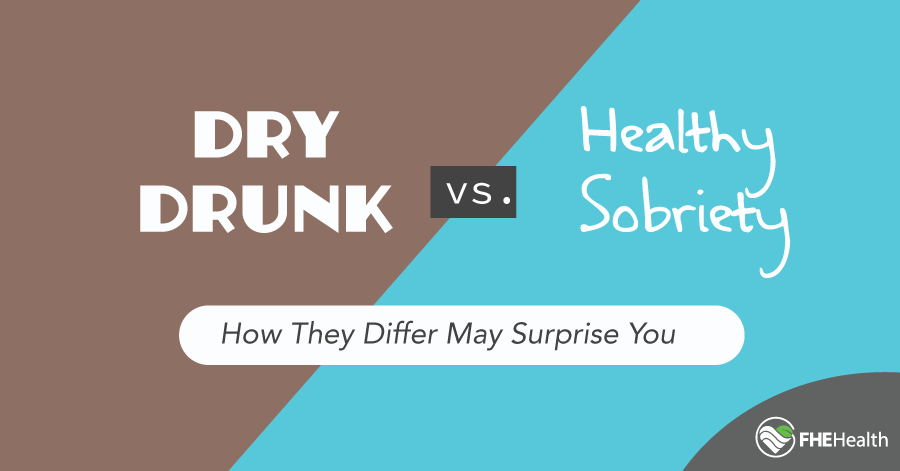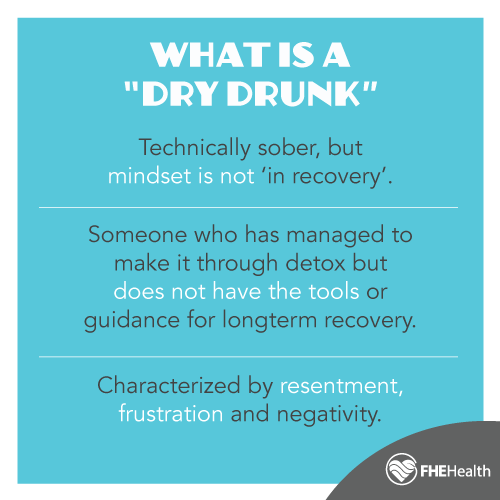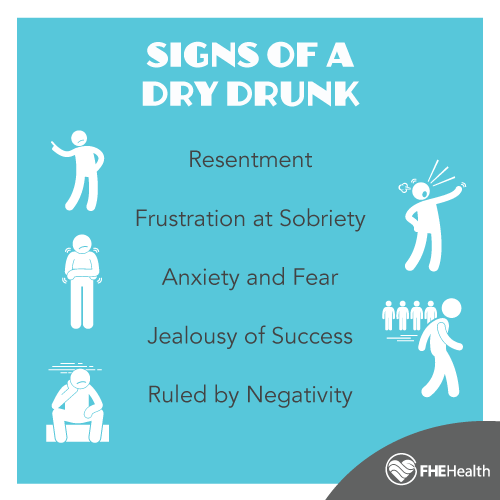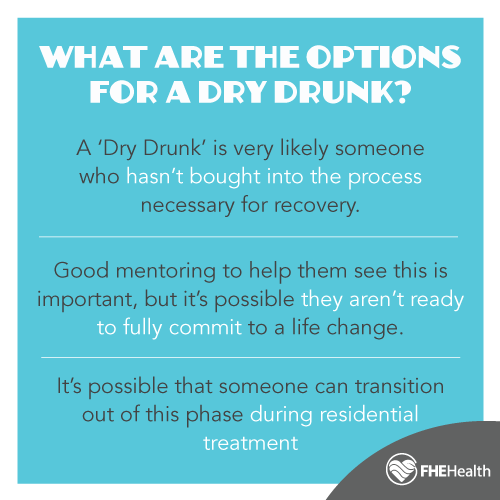
Updated May 13, 2025
Alcoholics Anonymous has a common saying: “It works if you work it.” In the rooms of AA and other 12-step groups, these words are a reminder that a recovery program is only as effective as the extent of personal buy-in. This lesson is just as true outside meeting halls and inpatient facilities, with an enduring application to recovery in general.
Recovery is an enormously difficult process. It is a journey that takes a lifetime, which is why it is so important to be fully committed. When an alcoholic, someone with alcohol use disorder, or any kind of addict attempts recovery without this complete, no-excuses buy-in, there’s a name for it: dry drunk syndrome.
The term may be somewhat familiar, but what does it really mean? Read on to learn how to spot a “dry drunk” or “dry alcoholic” and why it’s so important to be fully committed to sobriety when going through a recovery program.
The Classic “Dry Drunk”

Here is a sample anecdote describing what the term dry drunk means:
Sean began drinking in high school. At first, he just drank casually at parties with friends, yet his drinking soon occurred more often. In college, his drinking habits were considered “normal” due to the widespread social acceptance of binge drinking. As he neared graduation, however, it was clear he had a problem.
Drinking close to a half-dozen beers a day took a toll on his work. Although he managed to get his diploma, after graduation, he found it hard to get and keep a job. Friends and family saw how advanced Sean’s drinking had become and worried about alcoholism.
After a few years, Sean lost his driver’s license from multiple DUIs. He also spent several nights in jail for public drunkenness and disorderliness. His most recent charge resulted in mandated outpatient treatment for his alcoholism.
Sean is technically “in recovery” now, but because he has been mandated to be—and he’s still unwilling to admit his problem. He reminisces about being back in college and drinking with his buddies, but he’s simultaneously jealous of people who have successfully undergone rehab.
Sean is a dry drunk. Does his mindset seem conducive to successful recovery? The answer is clearly no. Sean is someone who would get singled out as high risk for relapse, a factor shared by many people with dry drunk syndrome.
What Is Dry Drunk Syndrome?
The term dry drunk first appeared in the 1983 book The Dry Drunk Syndrome, by R.J. Solberg, a founding member of AA. The term originally referred to a person who had quit drinking but did not adopt the mindset of a successful AA member.
Today the term dry drunk may apply to anyone who goes through a substance abuse rehab program without a full commitment to recovery. While dry drunks can be a product of mandated treatment, many people who choose to receive treatment think that treatment alone is all that is necessary to achieve lasting sobriety. It isn’t.
The Psychology of a Dry Drunk
A dry drunk never thinks they’re doing anything wrong. On the contrary, they’re masters at sleight of hand, of fooling others their behavior is perfectly fine. As such, they are often extraordinarily adept at lying, especially to themselves. They are also likely to shift blame to others and get them to accept responsibility for consequences, rather than take responsibility for the problem.
During treatment, the dry drunk may seemingly go along with the program, saying all the right things, completing assignments, attending therapy and group sessions, all the while thinking about getting out and back to life as normal. In other words, they go through the motions, never incorporating the essence and meaning of commitment to recovery. Being a dry drunk just isn’t a persona they accept. What’s happened to them is external, not something they caused by their alcoholic behavior.
This does not mean that the prospects for recovery are hopeless for someone with dry drunk syndrome—but it makes them harder to achieve when recovery is already a difficult process.
The dry drunk, like anyone seeking to overcome addiction, has to genuinely want recovery over everything else. That requires a commitment to change behavior, implement effective coping strategies, build and maintain a strong support network, and ask for help when needed.
How You May be a Dry Drunk Without Realizing it
Self-rationalization often comes into play with a dry drunk. It’s much easier to excuse dry alcoholic behavior by insisting that habits are under control or no real harm resulted. Thinking that you’ve always got control of the situation when it’s clear to others that this isn’t so is a sign that you may be a dry drunk, whether you realize it or not. Getting into the same scrapes and suffering the same consequences, or a cascade of increasingly serious consequences due to dry drunk syndrome is another undeniable aspect of the condition.
Signs and Symptoms of a Dry Drunk
Someone with dry drunk syndrome may display the following signs, symptoms, and behaviors:
Resentment for the person who convinced them to stop using
Although a parent, friend, or other loved one may have convinced the dry drunk to stop using, the dry drunk is not likely to realize that they are to blame for their situation. According to experts on effective recovery methods, this is a problem. Humility plays a major role in any successful recovery, and someone who cannot accept responsibility for their circumstances is unlikely to find success in their journey to sobriety.
Frustration at the fact that they’ll never be able to drink (or use drugs) again
Using drugs is more than just a physical addiction. It’s a mentality and, for many people, a crutch. By the time addiction fully develops, drug use can be deeply ingrained in a person’s psyche.
Realizing that they can’t ever drink or use drugs again may coincide with several conflicting emotions. These include frustration and annoyance—even a serious mental health issue such as depression and anxiety.
Realization of the things they missed
Everyone has goals, but addiction can completely push these goals aside. For the dry drunk, it’s difficult to accept an inability to change personal circumstances. Furthermore, inner conflict and being unable to reconcile missed opportunities can cause their recovery to suffer.
Having to be accountable
Addicts, especially when under the influence, are not generally accountable for their actions. In fact, many people use drugs and alcohol to excuse their behavior, a convenient way to place blame for things they did on a lack of self-control.
Once sober, however, the dry drunk painfully realizes their crutch to lean on is gone and they must be accountable for their actions.
Anxiety and fear of failure
Humans sometimes self-sabotage because they adopt a frame of mind that considers failure inevitable. Addicts may be more prone to this belief than others.
The dry drunk will take it as a predetermined outcome that they’ll fail in recovery and assumes a “why bother” attitude. This kind of self-defeatism makes failure a self-fulfilling prophecy and confirms doubts about the treatment and recovery process.
Jealous of those who have been successful
Groups like AA emphasize the ability to recover as a community and celebrate others’ successes along with one’s own. The dry drunk, on the other hand, lacks this quality. Instead, they see their peers succeeding and react with jealousy and resentment, not congratulations and unconditional support.
Why Dry Drunks Are Doomed to Failure
Disregard, for a moment, all the nuanced qualities of the “dry drunk mindset.” The reason the dry drunk has trouble getting and staying sober is simple: They choose not to make a commitment to a difficult process.
Recovery, just like dieting or weight loss, or quitting other bad habits, takes willpower and hard work. Yet it’s more than that. Without a willingness to fully commit to growing and developing a recovery-focused mindset, the odds of achieving lasting success are incredibly low.
How Can These Types of Addicts Get the Help They Need?
Reaching patients who exhibit any combination of the typical signs and symptoms of the dry drunk syndrome and resist buying into the program is a difficult task. What can be done to help those who don’t think they need help?
Sometimes, the solution means waiting and hoping that the person in question has a realization before it’s too late. Other times, a varied course of therapy and counseling can be successful. During sessions with an addiction counselor who helps the patient look inward at their own problem or by sitting in group sessions where others talk about similar experiences, patients who exhibit dry drunk syndrome may eventually discover that they don’t miss who they were when they were using. They may even come to realize that there are natural better highs out there that are much more satisfying than a drink or a drug.
Does Being a Dry Drunk Mean You Are Going to Relapse?
Relapse is common in addiction. It is not a failure or evidence of a moral deficit. While anyone who’s gone through treatment is prone to relapse, the dry drunk may be more likely to suffer a relapse because they’ve not fully committed to recovery. In their mind, they still harbor the desire to drink and engage in the same type of alcoholic behavior that got them into trouble in the first place.
Knowing the signs that signal impending relapse can help the dry drunk initiate proactive steps to get through the crisis. Reaching out for help from a treatment professional and sponsor and peers in AA are crucial at this time.
How Can You Support Someone Who is a Dry Drunk?
Giving up on a dry drunk is never a good idea. Without some ongoing guidance and support, the dry drunk will continue their same dry alcoholic behavior. It can be frustrating to watch the constant negative consequences resulting from the dry drunk syndrome, and it seems heartless to not want to take over and make things better. Yet, supporting someone who is a dry drunk is absolutely paramount, if there’s ever any chance of that person’s eventual successful recovery.
This does not mean doing things they should be doing for themselves. It may mean participating in family or couples therapy, as well as joining recovery and self-help groups for family members of the dry drunk. That’s as much because it’s important to learn about the disease of addiction and how things need to change at home following treatment as it is maintaining good self-care so that everyone in the family isn’t overwhelmed by the emotional and physical repercussions of supporting a dry drunk in the recovery process.
The Bottom Line: Dry Drunk Syndrome
Unfortunately, the dry drunk can’t be forced to see reality, no matter how much family, loved ones, and friends wish it could. There are still options.
Encourage them to get the help they need. Also, maintain a positive outlook in the hope that addiction treatment professionals can help them forge a solid commitment to recovery.
If you or a loved one struggles with an addiction to drugs or alcohol, contact FHE Health and let us show you your options for recovery.






